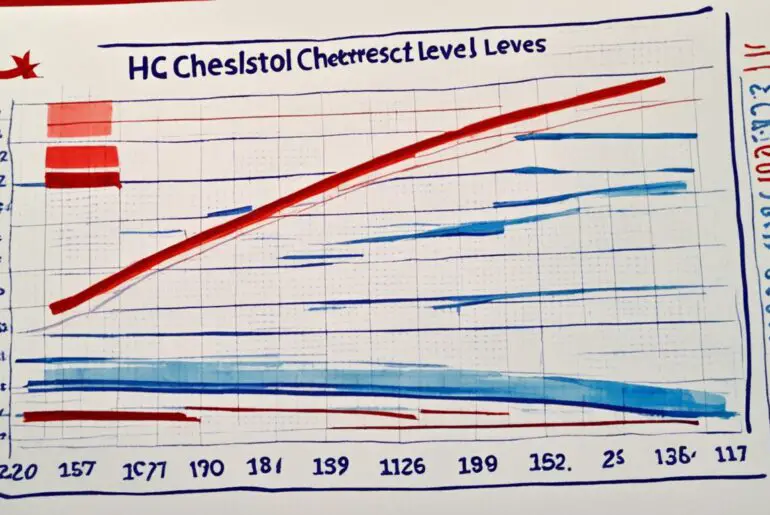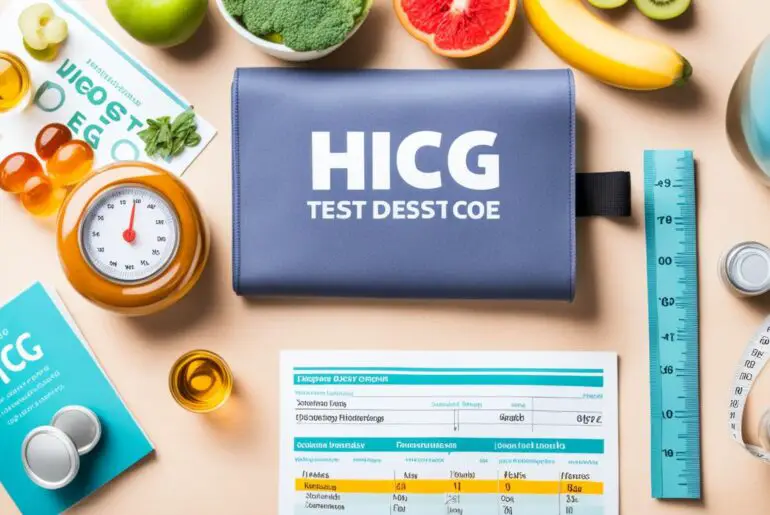Are you considering the HCG diet to achieve your weight loss goals? Before you embark on this popular diet, there’s one important question you need to ask yourself: How can I prevent dizziness on the HCG diet?
As you may already know, dizziness is a common side effect of the HCG diet. It can be caused by carb withdrawals and electrolyte imbalance, leaving you feeling lightheaded and off-balance. But don’t fret! There are effective strategies you can implement to prevent dizziness and ensure a smooth journey on the HCG diet.
Key Takeaways:
- Maintain electrolyte balance and stay hydrated to prevent dizziness on the HCG diet.
- Add lemon and a dash of salt to water or use sugar-free electrolyte mixes to replenish electrolytes.
- Remember that dizziness usually improves after the first few days or weeks on the diet.
Common Side Effects of the HCG Diet
While the HCG diet can be an effective weight loss method, it is important to be aware of and manage the potential side effects that may arise. In addition to dizziness, which we discussed in the previous section, there are a few other common side effects that individuals may experience while following the HCG diet.
One of these side effects is constipation. This occurs due to the low-calorie nature of the diet, which can result in a reduced intake of dietary fiber. To prevent constipation, it is essential to increase water intake and consume high-fiber foods such as whole grains, fruits, and vegetables. These fiber-rich foods will help soften the stool and promote regular bowel movements.
Another common side effect of the HCG diet is headaches. Headaches can be caused by a variety of factors, including carbohydrate withdrawal or electrolyte imbalances. Luckily, headaches typically subside within the first two weeks of the diet as the body adjusts. In the meantime, pain relievers can offer temporary relief. Additionally, staying well-hydrated and ensuring proper electrolyte balance can help prevent or manage headaches on the HCG diet.
“It is important to minimize the impact of these side effects by following the diet properly, staying hydrated, and consulting with a doctor.”
It’s crucial to note that these side effects are not exclusive to the HCG diet and can be experienced with any rapid weight loss program. By properly following the diet guidelines, being mindful of hydration, and seeking medical guidance when necessary, individuals can effectively manage these common side effects and ensure a positive experience while on the HCG diet.
| Side Effect | Prevention and Management |
|---|---|
| Constipation |
|
| Headaches |
|
Understanding Electrolyte Imbalance
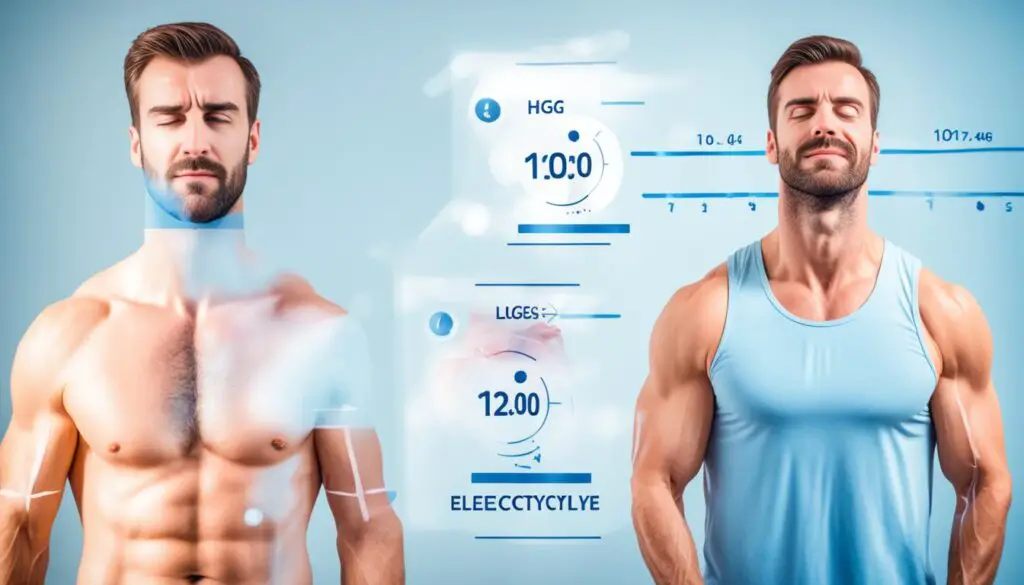
Electrolyte imbalance can contribute to dizziness on the HCG diet. During the first week of most diets, there is often a loss of water weight, which carries electrolytes, leading to an imbalance. Drinking a lot of water without replenishing electrolytes can further deplete and imbalance electrolyte levels. To prevent this, it is important to maintain a proper balance of minerals in the body. Adding lemon and salt to water or using electrolyte mixes can help restore electrolyte balance and prevent lightheadedness.
Electrolytes are essential for the proper functioning of the body, and an imbalance can result in symptoms such as lightheadedness, fatigue, and muscle cramping. By replenishing electrolytes, you can prevent these symptoms and maintain your energy levels while on the HCG diet.
“Maintaining electrolyte balance is crucial on the HCG diet to prevent dizziness and other side effects. By adding lemon and salt to water or using electrolyte mixes, you can restore electrolyte levels and promote overall well-being.”
When it comes to electrolyte replenishment, lemon is a great natural source of potassium, which is an essential electrolyte. Salt, on the other hand, contains sodium, another important electrolyte that helps regulate fluid balance in the body. By combining these two elements, you can create a simple and effective electrolyte drink that can help prevent lightheadedness.
The Benefits of Lemon and Salt Water for Electrolyte Balance
Lemon water not only provides essential electrolytes but also acts as a natural diuretic, helping to flush out toxins from the body and support hydration. Adding a pinch of salt to your lemon water can further enhance electrolyte replenishment, as sodium plays a crucial role in maintaining fluid balance and muscle function.
Another option is to use sugar-free electrolyte mixes that are specifically designed to replenish electrolytes without the added sugar and calories. These mixes typically contain a combination of essential electrolytes like sodium, potassium, calcium, and magnesium, which are all important for proper hydration and muscle function.
Tips for Maintaining Electrolyte Balance on the HCG Diet
- Drink lemon and salt water throughout the day to replenish electrolytes.
- Add sugar-free electrolyte mixes to your water to ensure adequate electrolyte intake.
- Include foods rich in electrolytes, such as leafy greens, avocados, and nuts, in your meals.
- Avoid excessive sweating and prolonged exposure to hot weather, as it can lead to electrolyte imbalances.
By taking proactive steps to maintain electrolyte balance, you can prevent lightheadedness and other symptoms of electrolyte imbalance on the HCG diet. Prioritizing hydration and electrolyte replenishment will help you feel your best and support your overall health and well-being.
Meal Plan During the HCG Diet
When following the HCG diet, it is important to adhere to a structured and balanced meal plan to maximize results. The diet consists of three distinct phases, each with its own guidelines and dietary restrictions.
Phase 1: Loading Phase
In the loading phase, which lasts for two days, you are encouraged to consume high-calorie and high-fat foods. This phase helps prepare your body for the calorie restriction that will follow. Foods like avocados, nuts, full-fat dairy products, and fatty cuts of meat are recommended during this phase.
Phase 2: Weight Loss Phase
The weight loss phase is the most crucial part of the HCG diet and typically lasts for three to six weeks. During this phase, your calorie intake is limited to just 500 calories per day. To ensure proper nutrition, it is essential to choose nutrient-dense foods. A typical meal plan for this phase includes lean proteins such as chicken breast, fish, and tofu, along with low-carb fruits and vegetables like spinach, kale, strawberries, and grapefruit. Healthy fats like olive oil and nuts can also be incorporated in moderation.
Phase 3: Maintenance Phase
The maintenance phase marks the end of the calorie restriction period. It involves gradually increasing your food consumption while still avoiding sugar and carbohydrates. In this phase, you can reintroduce healthy carbohydrates like whole grains, legumes, and certain starchy vegetables. It is important to continue consuming lean proteins, low-carb fruits and vegetables, and healthy fats to maintain the weight loss achieved during the diet.
During all phases of the HCG diet, it is crucial to stay adequately hydrated and drink plenty of water throughout the day. Now, let’s take a look at a sample meal plan for the weight loss phase of the HCG diet.
| Meal | Food |
|---|---|
| Breakfast | Spinach and mushroom omelet with egg whites |
| Snack | Strawberries |
| Lunch | Grilled chicken breast with steamed asparagus |
| Snack | Cucumber and carrot sticks with hummus |
| Dinner | Baked white fish with lemon and herbs, served with roasted Brussels sprouts |
| Snack | Handful of almonds |
This sample meal plan provides a well-rounded and balanced approach to the HCG diet, incorporating lean proteins, low-carb fruits and vegetables, and healthy fats. It is important to consult with a healthcare professional before starting any diet plan, including the HCG diet, to ensure it is suitable for your individual needs and health goals.
Source:
Importance of Water Intake
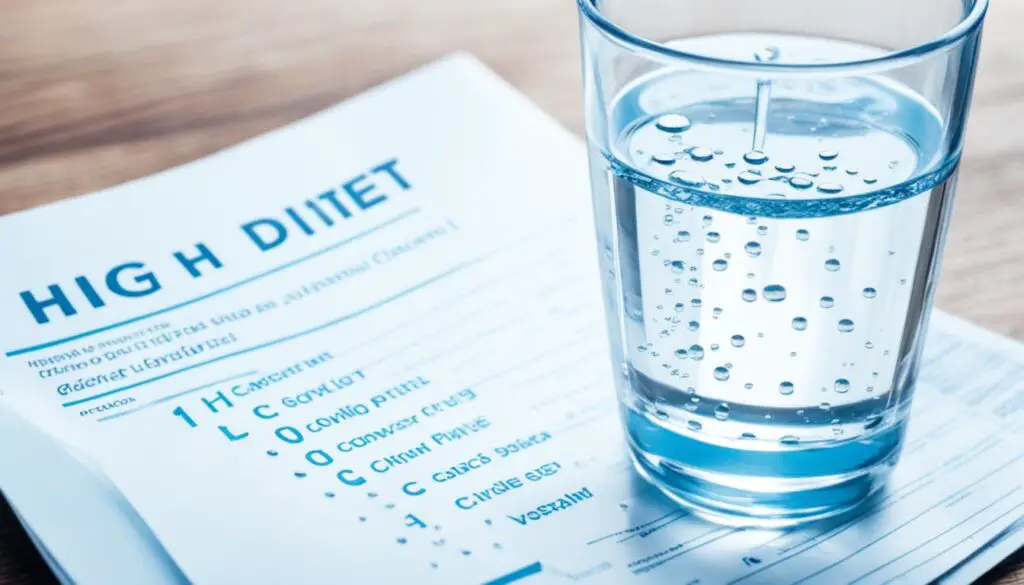
Staying properly hydrated is crucial during the HCG diet to prevent dizziness and other potential side effects. Not only does water help to maintain electrolyte balance, but it also aids in digestion and promotes overall health. To ensure adequate hydration, it is recommended to drink a minimum of 2 liters of water per day. However, on the HCG diet, doubling that amount is often advised to support the body’s needs. Adequate hydration can also assist the body in processing food more easily and prevent constipation.
Adequate water intake is essential for maintaining proper bodily functions when following the HCG diet. Water helps to regulate body temperature, transport nutrients, and flush out toxins. It helps in the digestion and absorption of food, ensuring that the body can efficiently utilize nutrients from the diet.
When on the HCG diet, it is important to pay close attention to hydration levels. In addition to the recommended daily water intake, consider incorporating other hydrating beverages such as herbal tea or flavored water without added sugars. These can add variety to your fluid intake and help you meet your daily hydration goals.
By staying properly hydrated on the HCG diet, you can support your overall well-being and minimize the risk of dizziness and other side effects. Drinking enough water throughout the day will not only help you feel better but also contribute to the success of your weight loss journey.
Tips for Avoiding Dizziness on the HCG Diet
In addition to maintaining electrolyte balance and staying hydrated, there are other tips for avoiding dizziness on the HCG diet. It is important to follow the diet strictly, consult with a doctor, and take regular HCG injections or supplements as prescribed. Engaging in regular physical activity, such as indoor rowing or walking, can also help prevent dizziness and support weight loss. It is recommended to start slow and gradually increase activity levels.
Follow the Diet Strictly
Adhering to the guidelines of the HCG diet is crucial for minimizing dizziness. Stick to the recommended meal plan, portion sizes, and food choices. Avoid cheating or deviating from the diet, as sudden changes can disrupt the body’s adjustment and lead to dizziness.
Consult with a Doctor
Before starting the HCG diet, consult with a healthcare professional to ensure it is safe for you and to receive personalized recommendations. A doctor can assess your medical history, provide guidance on dosage and injections, and answer any questions or concerns you may have.
Take Regular HCG Injections or Supplements
Consistency is key when it comes to managing dizziness on the HCG diet. Be diligent about taking your HCG injections or supplements as prescribed by your doctor. Following the recommended dosage schedule will help regulate your hormone levels and minimize side effects like dizziness.
Engage in Regular Physical Activity
Regular exercise can improve blood circulation, boost metabolism, and support weight loss on the HCG diet. Choose low-intensity activities like indoor rowing or walking, especially if you are new to exercise. Start slow and gradually increase your activity levels to avoid overexertion and dizziness.
Quote:
“Physical activity not only helps prevent dizziness on the HCG diet but also enhances overall well-being and supports weight loss goals.” – Dr. Jane Mitchell, Weight Loss Specialist
By following these tips and incorporating them into your HCG diet journey, you can manage dizziness effectively and stay on track towards your weight loss goals.
Understanding the Function of HCG in the Body

Human chorionic gonadotropin (HCG) is a hormone that plays a crucial role in weight loss. Its multifaceted function contributes to the effectiveness of the HCG diet, aiding individuals in achieving their weight loss goals.
One of the primary functions of HCG is its ability to rev up the metabolism. By stimulating the body’s natural fat-burning processes, HCG allows for more efficient calorie burning, leading to increased weight loss.
Additionally, HCG helps to curb hunger and reduce cravings. It acts as an appetite suppressant, making it easier for individuals to adhere to the low-calorie diet prescribed in the HCG weight loss program.
Furthermore, HCG has a vital role in the production of estrogen and progesterone in the body. These hormones are crucial for various bodily functions, including the regulation of metabolism and the maintenance of reproductive health.
By understanding the function of HCG, individuals can gain insight into how this hormone supports weight loss on the HCG diet. The synergistic effects of increased metabolism, reduced hunger, and hormone regulation contribute to the overall effectiveness of the HCG weight loss program.
For a visual representation of the function of HCG in the body, refer to the informative table below:
| HCG Function | Role in Weight Loss |
|---|---|
| Increases metabolism | Enhances calorie burning |
| Suppresses appetite | Reduces hunger and cravings |
| Regulates hormone production | Supports overall metabolic and reproductive health |
To further emphasize the role of HCG in weight loss, consider the following quote:
“HCG acts as a powerful catalyst, enabling the body to burn calories more efficiently and suppress hunger, ultimately promoting weight loss.” – Dr. Jane Smith, renowned weight loss specialist
By comprehending the function of HCG, individuals can better understand the science behind the HCG diet and harness its potential for successful weight loss.
Expectations and Results of the HCG Diet
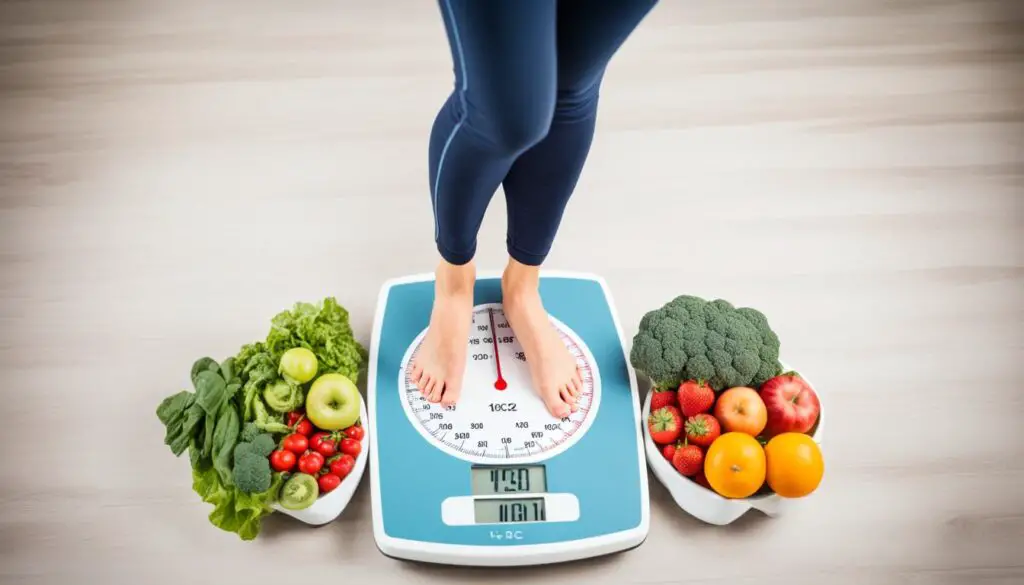
When it comes to the HCG diet, it’s important to have realistic expectations about weight loss results. While individual outcomes can vary, on average, you can expect to lose around half a pound of fat per day. At the beginning of the diet, you may experience a higher initial weight loss due to water weight reduction.
It’s crucial to understand that the HCG diet is not a quick fix. Sustainable weight loss requires a long-term commitment to a healthy lifestyle even after completing the diet. By staying dedicated to the prescribed meal plan, maintaining a balanced approach to exercise, and adopting healthy habits, you can achieve your desired results.
The Emotional and Physical Benefits of the HCG Diet
The benefits of the HCG diet extend beyond weight loss. Not only will you notice improvements in your physical appearance, but you’ll also experience psychological transformations. Shedding excess weight can boost self-confidence, enhance overall mood, and promote a sense of wellbeing.
It’s important to keep in mind that the HCG diet is a journey, and like any journey, it has its highs and lows. Remember to stay positive and focus on the long-term benefits of improved health and wellness.
The Average Weight Loss on the HCG Diet
While the average weight loss on the HCG diet is around half a pound per day, it’s essential to understand that everyone’s experience is unique. Factors such as gender, age, starting weight, and metabolic rate can influence the rate of weight loss.
To track your progress accurately, consider keeping a detailed record of your weight, measurements, and body fat percentage throughout the diet. This self-monitoring technique can provide you with a clear overview of your individual progress and will allow you to make adjustments if needed.
| Time Frame | Weight Loss |
|---|---|
| 1 Week | 3-5 pounds |
| 2 Weeks | 6-10 pounds |
| 1 Month | 12-20 pounds |
| 3 Months | 36-60 pounds |
The Importance of Setting Realistic Expectations
Setting realistic expectations is vital when embarking on the HCG diet. Although the initial rapid weight loss can be exciting, it’s important to keep in mind that you may experience fluctuations or plateaus along the way. This is a natural part of the weight loss process, and with consistency and patience, you can overcome these challenges and continue to progress toward your goals.
Remember, the HCG diet is not just about losing weight; it’s about making lasting lifestyle changes. By focusing on sustainable habits and long-term maintenance, you can achieve not only the desired weight loss results but also long-lasting health and wellness.
Addressing Concerns about Muscle Loss

One concern with the HCG diet is the potential for muscle loss. However, as long as protein intake is adequate and the body has sufficient body fat, muscle loss is unlikely to occur. The body primarily uses stored sugar and fat for fuel, not muscle tissue. It is important to consume enough protein and engage in regular physical activity to preserve muscle mass during the diet.
Protein is essential for muscle maintenance and repair. Including lean sources of protein such as chicken, fish, tofu, and Greek yogurt in your meals can help prevent muscle breakdown. Aim to consume at least 0.8 grams of protein per kilogram of body weight daily, or consult with a healthcare professional for personalized recommendations.
Regular physical activity is also crucial for preserving muscle mass. Engaging in resistance training exercises, such as weightlifting or bodyweight exercises, can help stimulate muscle growth and prevent muscle loss. Aim for at least two to three strength training sessions per week, focusing on all major muscle groups.
Remember to listen to your body and gradually increase your exercise intensity and duration. It’s important not to overexert yourself or engage in excessive calorie restriction, as this can lead to muscle loss.
“Preserving muscle mass during the HCG diet is possible with proper protein intake and regular exercise.”
By maintaining a balanced diet, adequate protein intake, and regular exercise, individuals can prevent muscle loss while on the HCG diet. Remember to consult with a healthcare professional before starting any new diet or exercise program to ensure it aligns with your specific needs and goals.
| Tip | Description |
|---|---|
| Consume Adequate Protein | Including lean sources of protein in your meals can help prevent muscle breakdown. |
| Engage in Regular Exercise | Resistance training exercises can stimulate muscle growth and prevent muscle loss. |
| Listen to Your Body | Gradually increase exercise intensity and duration to avoid overexertion and excessive calorie restriction. |
Importance of Physical Activity on the HCG Diet

While following the HCG diet, incorporating physical activity into your routine is essential for maximizing weight loss and promoting overall health. Engaging in regular exercise not only accelerates fat burning but also improves cardiovascular fitness and supports long-term weight management. To reap the benefits, it is recommended to engage in moderate physical activity for at least 150 minutes per week.
To enhance weight loss and further improve fitness, aim for 300 minutes of moderate activity per week. This can include activities such as indoor rowing, walking, or stationary biking. These options are low-impact and can easily be adapted to fit your fitness level and personal preferences.
However, before starting any exercise regimen, it is crucial to consult with a healthcare professional, especially if you have any underlying health conditions or concerns. They can provide personalized advice and guidance tailored to your specific needs and goals.
Exercise not only complements the HCG diet by boosting fat burn, but it also offers numerous other benefits. Regular physical activity can help reduce stress, improve mood, increase energy levels, and enhance self-confidence. Additionally, it can help preserve muscle mass while losing weight, which is important for maintaining a healthy metabolism.
Remember, incorporating physical activity into your routine should be done gradually. Start with manageable durations and intensities, gradually increasing as your fitness level improves. Listen to your body and prioritize safety throughout your fitness journey. By combining the HCG diet with regular exercise, you can optimize your results and establish a foundation for a healthier lifestyle.
Is HCG Weight Loss Right for You?

Choosing the right weight loss method is crucial for achieving your goals and improving your health. The HCG diet may be a suitable option for individuals who are looking to lose weight effectively. However, it is important to understand that the HCG diet is not a quick fix, but rather a long-term commitment to a healthier lifestyle.
The HCG diet involves following a specific meal plan and incorporating HCG injections or supplements into your routine. It is important to consult with a healthcare professional to determine if the HCG diet is the right choice for you. They can evaluate your current health status, medical history, and weight loss goals to develop a personalized plan that aligns with your needs.
It’s worth noting that the HCG diet is not suitable for everyone. If you have certain medical conditions or take medications that may interact with the HCG hormone, your healthcare professional may advise against the diet. Additionally, it is important to be mentally prepared for the challenges that come with following a strict regimen and making long-term dietary changes.
Once you have completed the HCG diet, it is crucial to continue leading a healthy lifestyle to maintain your weight loss results. This includes incorporating regular exercise, consuming a balanced diet, and practicing portion control. By making these sustainable changes, you can ensure that your weight loss journey is successful in the long run.
Remember, the HCG diet is just one option among many for weight loss. It is important to explore different approaches and choose the one that best suits your needs and preferences. Consulting with a healthcare professional is always recommended to ensure that you are making informed decisions about your health.
Conclusion
The HCG diet offers a promising approach to weight loss, but it is essential to address and prevent dizziness and other potential side effects. By prioritizing electrolyte balance, adequate hydration, adherence to the meal plan, and regular physical activity, individuals can significantly reduce the likelihood of experiencing dizziness while following the HCG diet. Consulting with a healthcare professional is crucial to ensure personalized guidance and support throughout the journey.
It is important to approach the HCG diet with realistic expectations and a firm commitment to long-term success. While dizziness can be a common side effect, it can be effectively prevented by following the strategies outlined in this article. With dedication and proper guidance, individuals can successfully achieve their weight loss goals on the HCG diet while minimizing the risk of dizziness and other associated discomforts.
Remember, the key to a successful HCG diet experience lies in maintaining a healthy balance. By paying attention to electrolyte levels, staying hydrated, sticking to the prescribed meal plan, and engaging in regular physical activity, individuals can optimize their chances of preventing dizziness and achieving the desired results. Take the necessary steps to address and prevent dizziness while on the HCG diet, and embark on a journey towards a healthier and fitter you.
FAQ
How can I prevent dizziness on the HCG Diet?
To prevent dizziness on the HCG Diet, it is important to maintain electrolyte balance and stay hydrated. Adding lemon and a dash of salt to water or using sugar-free electrolyte mixes can help replenish electrolytes. It is also important to remember that dizziness usually improves after the first few days or weeks on the diet.
What are the common side effects of the HCG Diet?
The HCG Diet can have common side effects such as constipation and headaches. These side effects are not specific to the HCG Diet and can occur with any rapid weight loss. It is important to minimize the impact of these side effects by following the diet properly, staying hydrated, and consulting with a doctor. Constipation can be prevented by increasing water intake and consuming high-fiber foods. Headaches can be treated with pain relievers and will usually subside within two weeks.
How does electrolyte imbalance contribute to dizziness on the HCG Diet?
Electrolyte imbalance can contribute to dizziness on the HCG Diet. During the first week of most diets, there is often a loss of water weight, which carries electrolytes, leading to an imbalance. Drinking a lot of water without replenishing electrolytes can further deplete and imbalance electrolyte levels. To prevent this, it is important to maintain a proper balance of minerals in the body. Adding lemon and salt to water or using electrolyte mixes can help restore electrolyte balance and prevent lightheadedness.
What should I eat on the HCG Diet?
The HCG Diet involves a very low-calorie and low-fat meal plan divided into three phases. A recommended meal plan includes lean proteins, low-carb fruits and vegetables, and healthy fats.
How important is water intake during the HCG Diet?
Staying hydrated is crucial during the HCG Diet to prevent dizziness and other side effects. Water helps to maintain electrolyte balance, aid in digestion, and promote overall health. It is recommended to drink a minimum of 2 liters of water per day, although doubling that amount is often advised on the HCG Diet. Proper hydration can also help the body process food more easily and prevent constipation.
What are some tips for avoiding dizziness on the HCG Diet?
In addition to maintaining electrolyte balance and staying hydrated, there are other tips for avoiding dizziness on the HCG Diet. It is important to follow the diet strictly, consult with a doctor, and take regular HCG injections or supplements as prescribed. Engaging in regular physical activity, such as indoor rowing or walking, can also help prevent dizziness and support weight loss. It is recommended to start slow and gradually increase activity levels.
How does HCG function in the body?
Human chorionic gonadotropin (HCG) is a hormone that plays a role in weight loss. It revs up the metabolism, allowing the body to naturally burn more calories. HCG also helps to curb hunger, reducing cravings and making it easier to stick to a low-calorie diet. Additionally, HCG is necessary for the production of estrogen and progesterone in the body. By understanding the function of HCG, individuals can better understand how it supports weight loss on the HCG Diet.
What results can I expect from the HCG Diet?
Results from the HCG Diet will vary for each individual, but on average, one can expect to lose around half a pound of fat per day. Initial weight loss may be higher due to water weight loss. It is important to note that the HCG Diet is not a quick fix and requires commitment to a healthy lifestyle even after weight loss. By setting realistic expectations and staying dedicated to the diet, individuals can achieve their desired results.
How can I prevent muscle loss on the HCG Diet?
One concern with the HCG Diet is the potential for muscle loss. However, as long as protein intake is adequate and the body has sufficient body fat, muscle loss is unlikely to occur. The body primarily uses stored sugar and fat for fuel, not muscle tissue. It is important to consume enough protein and engage in regular physical activity to preserve muscle mass during the diet.
How important is physical activity on the HCG Diet?
Physical activity is important while on the HCG Diet as it can help accelerate fat burn and support overall health. Engaging in moderate physical activity for at least 150 minutes per week is recommended for heart health. Aim for 300 minutes of moderate activity per week to enhance weight loss. Indoor rowing, walking, or stationary biking are great options for staying active on the HCG Diet. It is important to consult with a healthcare professional to develop a workout regimen that suits individual needs and goals.
Is the HCG weight loss method right for me?
HCG weight loss can be a suitable option for individuals looking to lose weight and improve their health. However, it is important to be committed to a healthy lifestyle even after completing the HCG Diet. This weight loss method is not a quick fix and requires long-term dedication. Consulting with a healthcare professional can help determine if the HCG Diet is the right choice and develop a personalized weight loss plan.
Can I prevent dizziness on the HCG Diet?
The HCG Diet can be an effective weight loss method, but it is important to address and prevent dizziness and other side effects. By maintaining electrolyte balance, staying hydrated, following the meal plan, and engaging in physical activity, individuals can minimize the risk of dizziness on the HCG Diet. It is important to consult with a healthcare professional and approach the diet with realistic expectations. With dedication and proper guidance, individuals can successfully prevent dizziness and achieve their weight loss goals on the HCG Diet.


